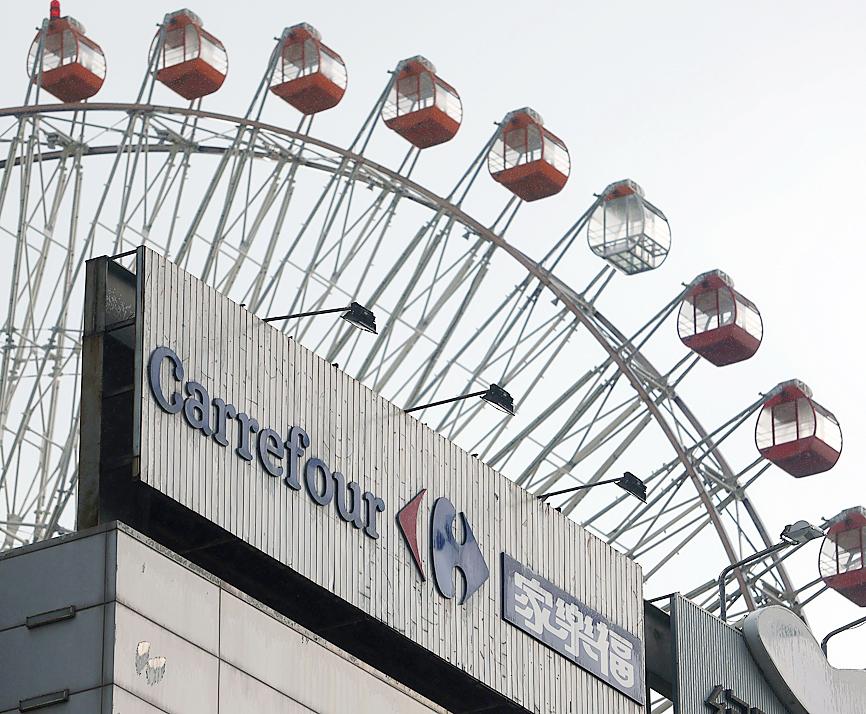Uni-President Group’s (統一集團) acquisition of Carrefour Taiwan (家樂福) is not likely to hurt consumers, but rather result in lower prices driven by more competition among major Taiwanese supermarket chains, marketing experts said yesterday.
Uni-President on Tuesday said it had reached an agreement to acquire 60 percent of Carrefour Taiwan for NT$29 billion (US$970.22 million).
Added to the 40 percent stake it already owned, the hypermarket chain now has complete ownership of Carrefour Taiwan.

Photo: CNA
The deal has sparked concern that it would give Uni-President and its main competitor, PX Mart Co (全聯實業), greater leverage to raise prices of daily necessities.
Such increases are unlikely, as neither Uni-President nor PX Mart monopolize the Taiwanese grocery market, said Wu Shih-hao (吳師豪), a professor in the Department of Marketing and Distribution at National Kaohsiung University of Science and Technology.
Consumers are sensitive to price increases, so “if Uni-President wanted to hike prices, people would simply shop at PX Mart or Costco instead,” Wu said.
Uni-President is likely to offer more discounts amid fiercer price competition, although that could result in smaller margins for Carrefour Taiwan’s upstream suppliers, he said.
Loyal Carrefour customers should not worry about any radical change in the Carrefour brand, Wu said.
Citing US and Japanese studies, Wu said that most shoppers tend to choose a supermarket chain for the product brands they carry.
Therefore, Uni-President is unlikely to stop supplying the French brands commonly found at Carrefour, Wu said.
With the acquisition of Carrefour Taiwan, Uni-President is expected to cement its lead in the country’s retail industry.
Li Shyh-jane (李世珍), deputy director-general of the Commerce Development Research Institute’s Business Model Innovation Research Division, expressed similar views, saying that with the acquisition, such companies are likely to offer more discounts and deals.
“A head-to-head competition between Uni-President and PX Mart is a good thing, from a consumer’s point of view,” he said.
Separately, Taiwan Ratings Corp (中華信評) on Wednesday said that Uni-President has strong cash flow and a high cash balance to fund the acquisition of Carrefour Taiwan.
“The increased retail network penetration and diversification achieved through the acquisition will shore up Uni-President Group’s profitability,” Taiwan Ratings said.
The transaction would not impair Uni-President’s financial strength, and the company is likely to maintain its operating performance over the next one to two years, judging by its business diversity and improved profitability from its operations in China, Taiwan Ratings said.
Additional reporting by Crystal Hsu

Zhang Yazhou was sitting in the passenger seat of her Tesla Model 3 when she said she heard her father’s panicked voice: The brakes do not work. Approaching a red light, her father swerved around two cars before plowing into a sport utility vehicle and a sedan, and crashing into a large concrete barrier. Stunned, Zhang gazed at the deflating airbag in front of her. She could never have imagined what was to come: Tesla Inc sued her for defamation for complaining publicly about the vehicles brakes — and won. A Chinese court ordered Zhang to pay more than US$23,000 in

Taiwan Semiconductor Manufacturing Co (TSMC, 台積電) yesterday held its first board of directors meeting in the US, at which it did not unveil any new US investments despite mounting tariff threats from US President Donald Trump. Trump has threatened to impose 100 percent tariffs on Taiwan-made chips, prompting market speculation that TSMC might consider boosting its chip capacity in the US or ramping up production of advanced chips such as those using a 2-nanometer technology process at its Arizona fabs ahead of schedule. Speculation also swirled that the chipmaker might consider building its own advanced packaging capacity in the US as part

Taiwan Semiconductor Manufacturing Co (TSMC, 台積電) yesterday said that its investment plan in Arizona is going according to schedule, following a local media report claiming that the company is planning to break ground on its third wafer fab in the US in June. In a statement, TSMC said it does not comment on market speculation, but that its investments in Arizona are proceeding well. TSMC is investing more than US$65 billion in Arizona to build three advanced wafer fabs. The first one has started production using the 4-nanometer (nm) process, while the second one would start mass production using the

US President Donald Trump has threatened to impose up to 100 percent tariffs on Taiwan’s semiconductor exports to the US to encourage chip manufacturers to move their production facilities to the US, but experts are questioning his strategy, warning it could harm industries on both sides. “I’m very confused and surprised that the Trump administration would try and do this,” Bob O’Donnell, chief analyst and founder of TECHnalysis Research in California, said in an interview with the Central News Agency on Wednesday. “It seems to reflect the fact that they don’t understand how the semiconductor industry really works,” O’Donnell said. Economic sanctions would